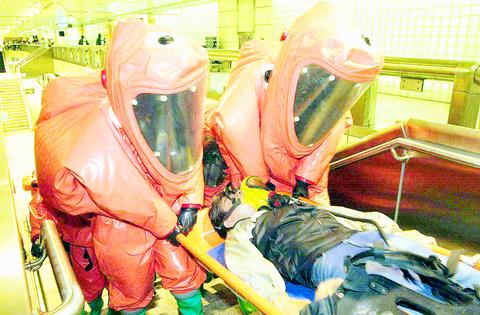After having been rehearsed twice, the largest-ever cross-department chemical-attack drill yesterday was held successfully at a downtown Taipei MRT stop, but the premier wondered if the attack response teams could handle a surprise drill.
The drill took place at the Hsiao Nanmen station near the Presidential Office, the Ministry of National Defense office and other government buildings. The drill simulated a response to a sarin gas attack in an MRT passenger car.

PHOTO: CHIANG YING-YING, TAIPEI TIMES
Premier Chang Chun-hsiung (張俊雄), who watched the drill from start to finish, praised it as a success, but did tell authorities involved that there was room for improvement.
Chang said he would like to see a similar drill held without any warning.
"I want to know how well our chemical-attack response teams can respond to conditions that they are not warned of in advance. This is a test that I want relevant agencies and other local governments to conduct in the future," Chang said.
The chemical-attack response teams from the Taipei municipal fire department, the Environmental Protection Administration and the army, together conducted yesterday's drill, had undergone two previous rehearsals for the attack scenario and were also informed of yesterday's drill in advance.
Chang also cast doubt on procedures recommended by the army for the public to follow in the event of a chemical attack.
The procedures are on a small card printed by the army for distribution to the public.
The cards list five steps for what to do in case of a chemical attack: Run out of the contaminated place, remove one's clothing, bathe with clean water, put on clean clothes and seek medical treatment.
Chang suggested that the first step could be inappropriate in that it might cause people to panic and run away from the scene in a dangerous manner.
"It is essential that every citizen be issued one of these cards, but before that's done I hope the authorities concerned can reconsider whether it is appropriate to suggest `run' as the first step to be taken," Chang said.
An article printed on Friday's opinion page in a local newspaper, had also strongly questioned if running is an appropriate first step.
The article, written by a doctor at National Taiwan University Hospital, argues that if people are urged to run immediately out of a contaminated place, the situation could rapidly spin out of control and that many people could be trampled or that they might quickly spread the gas agent to other places.
The doctor suggested a safer approach would be to have chemical-attack personnel at the site in charge of getting the situation under control.

The CIA has a message for Chinese government officials worried about their place in Chinese President Xi Jinping’s (習近平) government: Come work with us. The agency released two Mandarin-language videos on social media on Thursday inviting disgruntled officials to contact the CIA. The recruitment videos posted on YouTube and X racked up more than 5 million views combined in their first day. The outreach comes as CIA Director John Ratcliffe has vowed to boost the agency’s use of intelligence from human sources and its focus on China, which has recently targeted US officials with its own espionage operations. The videos are “aimed at

STEADFAST FRIEND: The bills encourage increased Taiwan-US engagement and address China’s distortion of UN Resolution 2758 to isolate Taiwan internationally The Presidential Office yesterday thanked the US House of Representatives for unanimously passing two Taiwan-related bills highlighting its solid support for Taiwan’s democracy and global participation, and for deepening bilateral relations. One of the bills, the Taiwan Assurance Implementation Act, requires the US Department of State to periodically review its guidelines for engagement with Taiwan, and report to the US Congress on the guidelines and plans to lift self-imposed limitations on US-Taiwan engagement. The other bill is the Taiwan International Solidarity Act, which clarifies that UN Resolution 2758 does not address the issue of the representation of Taiwan or its people in

US Indo-Pacific Commander Admiral Samuel Paparo on Friday expressed concern over the rate at which China is diversifying its military exercises, the Financial Times (FT) reported on Saturday. “The rates of change on the depth and breadth of their exercises is the one non-linear effect that I’ve seen in the last year that wakes me up at night or keeps me up at night,” Paparo was quoted by FT as saying while attending the annual Sedona Forum at the McCain Institute in Arizona. Paparo also expressed concern over the speed with which China was expanding its military. While the US

SHIFT: Taiwan’s better-than-expected first-quarter GDP and signs of weakness in the US have driven global capital back to emerging markets, the central bank head said The central bank yesterday blamed market speculation for the steep rise in the local currency, and urged exporters and financial institutions to stay calm and stop panic sell-offs to avoid hurting their own profitability. The nation’s top monetary policymaker said that it would step in, if necessary, to maintain order and stability in the foreign exchange market. The remarks came as the NT dollar yesterday closed up NT$0.919 to NT$30.145 against the US dollar in Taipei trading, after rising as high as NT$29.59 in intraday trading. The local currency has surged 5.85 percent against the greenback over the past two sessions, central